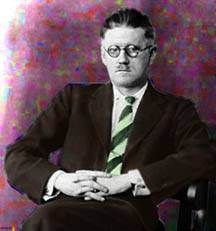 This amateur guide to James Joyce is intended to do two things: First, to introduce this modernist master to the philistines out there who have either never read or never heard of him, and second, to delineate the books according to the level of Joyce enthusiast you aspire to be. In other words, instead of doing these four books piecemeal, I’ve decided to lump them all together into four levels of increasing pain and frustration.
This amateur guide to James Joyce is intended to do two things: First, to introduce this modernist master to the philistines out there who have either never read or never heard of him, and second, to delineate the books according to the level of Joyce enthusiast you aspire to be. In other words, instead of doing these four books piecemeal, I’ve decided to lump them all together into four levels of increasing pain and frustration.
Part Two – The Intermediate: Swelling, bladder weakness and insomnia.
Having made it past the befuddling behemoth of Ulysses, intermediate-level Joyce scholars should try The Dubliners: a selection of fifteen short stories that actually make sense as far as the English language goes. All of them end with the main character’s sudden epiphany about some aspect of themselves or their situation before the story trails off into the desert. From truant schoolboys out for a good time to small-time politicians with inferiority issues, Joyce exhibits an uncanny knack for unique characterization. His stories span the social classes and varied landscape of Dublin, yet he manages to capture subtle differences in speech and vocabulary, as well as contributes individual mannerisms to all of his characters:
“Freddy Malins exploded, before he had well reached the climax of his story, in a kink of high-pitched bronchitic laughter and, setting down his untasted and overflowing glass, began to run the knuckles of his left fist backwards and forwards into his left eye, repeating words of his last phrase as well as his fit of laughter would allow him.”
Freddy Malins is a character from “The Dead,” one of the more recognizable of the fifteen stories, but only because it was a play, then John Huston made a movie out of it in 1987. Another Dubliners story worth reading is “A Painful Case.” In it, a man realizes that he unwittingly sentenced a married woman to a life of dreariness, isolation, and a nasty bout of locomotive head trauma when he spurned her affections. Pick and choose amongst the other thirteen. For the most part, The Dubliners caused some eye glazing and a bit of restless leg syndrome, but the physical discomfort will not deter a true Joyce devotee.
As a public service announcement and brief aside, I do not recommend anyone read Joyce’s book of poetry. Chamber Music is not worth the time necessary to heat Spaghettios in the microwave. Instead, read the works of Joyce’s fellow Irish countrymen, Oscar Wilde and William Butler Yeats.
Oscar Wilde’s poetry wallows in love and springtime frivolity like Joyce’s, but Wilde’s language is infinitely richer. “The Ballad of Reading Gaol” is especially good, as are the whole of his quotables.
Yeats is a master poet; more than one novel has taken its title from one of his poems. The first line of “Sailing to Byzantium” includes the phrase “no country for old men.” “Things fall apart,” appears in “The Second Coming,” but I suppose that title could have come from anywhere.
One or both of these gentlemen will cleanse James Joyce from the palate. They certainly blow The Dubliners out of the water.
See Lindy’s Essential Joyce Part I here.








